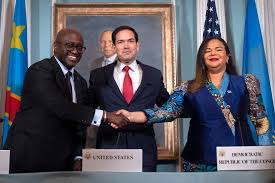
The Democratic Republic of Congo (DRC) and Rwanda have taken a significant step toward implementing their June 27, 2025, peace agreement, holding the second meeting of the Joint Security Coordination Mechanism (JSCM) in Washington, DC, on September 17-18.
The talks, supported by the United States, Qatar, Togo as African Union facilitator, and the African Union Commission, aimed to strengthen security cooperation and restore stability in eastern DRC.
During the two-day meeting, participants reviewed the security situation in the region, exchanged intelligence, and sought to establish a shared understanding of the operational environment.
This facilitated the definition of a phased approach to executing the Concept of Operations (CONOPS), including the neutralization of the Democratic Forces for the Liberation of Rwanda (FDLR) and associated armed groups, as well as the disengagement of forces and the lifting of Rwanda’s defensive measures.
The DRC and Rwanda reaffirmed their commitment to achieving the objectives outlined in CONOPS: eliminating the FDLR threat, restoring the authority of the Congolese state, and rebuilding trust between the two countries. An operational order (OPORD) was negotiated during the meeting, with implementation scheduled to begin on October 1, 2025.
Both governments expressed gratitude to international partners for their support and emphasized their shared dedication to promoting lasting peace and security in eastern DRC and the wider Great Lakes region.
Addressing the United Nations General Assembly, DRC President Félix Tshisekedi highlighted the broader context of justice and accountability in peacebuilding.
“A peace built on impunity is only a precarious armistice. Recognize the Congolese genocide and help us build lasting peace in the heart of Africa,” he said, calling on the international community to acknowledge mass crimes and support efforts to end impunity.
Analysts note that the Washington talks represent a critical milestone in the fragile but ongoing efforts to stabilise eastern DRC. By coordinating security measures, dismantling armed groups, and fostering cross-border cooperation, the DRC and Rwanda aim to transform a tense border region into a foundation for durable regional stability.
The success of this initiative will be closely watched, as the implementation of CONOPS and the neutralization of the FDLR will test the resilience of regional diplomacy and the commitment of both nations to sustained peace.



